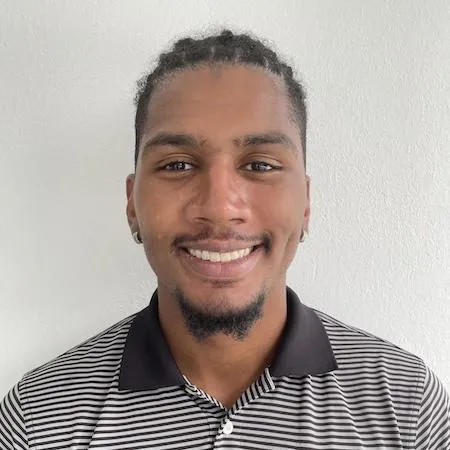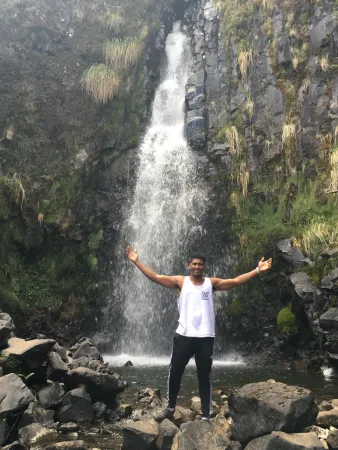SESYNC is pleased to welcome Damani Eubanks as our newest graduate fellow. Eubanks is the inaugural recipient of the Dr. Richard Payne Graduate Fellowship, which strives to recognize excellence in graduate students within the University of Maryland’s (UMD’s) College of Computer, Mathematical, and Natural Sciences by supporting innovative and actionable research that directly links social and environmental sciences. The fellowship honors Dr. Payne’s outstanding professional and personal contributions to the University of Maryland, including serving as a Professor in the Department of Biology, a member of the University Senate, and a dedicated instructor and mentor for students and postdocs.
Eubanks is currently in his third year of his PhD Program within UMD’s Behavior, Ecology, Evolution, and Systems Program, where he is studying forest health. His research focuses on developing a quantitative, globally applicable definition of forest health for use in ecological research and forest management activities. His ultimate goal is to use past forest health data to develop a predictive model to forecast forest health outcomes into the future, informing management and policy work.
Eubanks says his interest in forest health emerged when doing field work in Costa Rica’s tropical dry forest. “I was working with a team establishing a long-term forest monitoring plot in Santa Rosa National Park for the Smithsonian ForestGEO project,” he shared. “As I was out in the field collecting data, I was thinking of all of the different ways that scientists would be able to use this data, and how it might be applied for different research and conservation purposes.”
He said the concept of forest health came about when he was looking for ways to combine forest ecology research with conservation management and environmental policy work. “I had seen that there was kind of a disconnect there between some of the research I had been doing and reading versus the conservation and policy outcomes that were happening. So, the concept of forest health came as a crossroads between the two—a way to kind of have ecologists out in the field be able to pass on their data to forest managers and policy makers to kind of close that gap and try to use some of this research in a more actionable way,” he said.
For example, he said he hoped his research might result in collaboration between ecologists, forest managers, conservationists, and policy makers in identifying forested areas in need of new or different strategies for forest management and conservation.
Eubanks said his big goal for the project would be to develop a global forest health monitoring network that could inform decision making on local and global scales, as well as predict forest health outcomes decades into the future. He says he also sees the potential for this research to have a direct impact on communities most affected by forest health.
“I strongly believe that my research has the potential to aid the millions of underserved minorities who rely on forest ecosystems for their important services like food and water security,” he said. “I’ve seen a disconnect between ecological research, conservation and the local populations who serve to benefit, or be harmed by important environmental decisions, especially in the tropics. If I could work to bridge this gap and engage local people more in the stewardship of their own environment, I think that could make a real difference.”
Throuh this fellowship with SESYNC and his involvement with UMD’s Global Stewards Fellowship Program, Eubanks is looking forward to the opportunity to grow his experience in doing interdisciplinary work to bring some of his research goals to fruition. While at SESYNC, Eubanks said he hopes to improve his skills and experience in complex statistical modeling, work with and gain a better understanding of researchers in other fields, and expand his professional network. “I think that this experience will aid greatly in the progression of my research and my career goals in different aspects, from securing grant funding, to presenting my research to government agencies and the public, to being able to work across different fields, talking to other scientists, engineers, stakeholders, and policymakers,” he said.
He added, “I’m very grateful to be participating in the fellowship, especially in its inaugural year, and hope that I can make a difference and make an example for other young scientists who are interested in these kinds of issues.”

